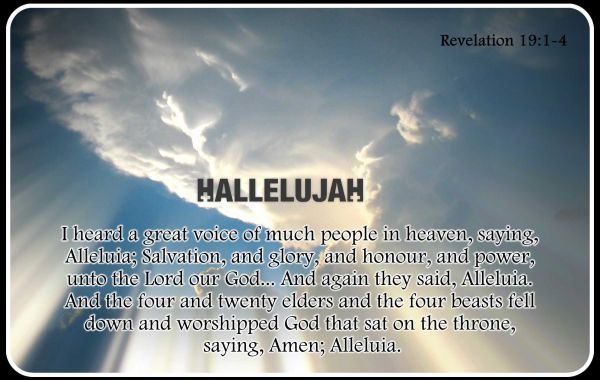There are three songs sung in these opening verses.
Alleluia, For The Harlot is Judged (vv. 1–4).
Praise, For the Lord God Reigns (vv. 5–6).
Rejoice, For The marriage of the Lamb is come (vv. 7–10
Alleluia, For The Harlot is Judged (vv. 1–4). 1 And after these things I heard a great voice of much people in heaven, saying, Alleluia; Salvation, and glory, and honour, and power, unto the Lord our God: 2 For true and righteous are his judgments: for he hath judged the great whore, which did corrupt the earth with her fornication, and hath avenged the blood of his servants at her hand. 3 And again they said, Alleluia. And her smoke rose up for ever and ever. 4 And the four and twenty elders and the four beasts fell down and worshipped God that sat on the throne, saying, Amen; Alleluia.
This is the Hallelujah Chorus of Revelation, four times in these opening verses we hear the host of heaven sing out, Hallelujah!
The first Song of Hallelujah is sung because the Great Harlot, the anti-religion, the persecutor and killer of God’s people has been destroyed as we studied last week. Revelation 18:24, “And in her was found the blood of prophets, and of saints, and of all that were slain upon the earth.
These songs are a direct response to Revelation 18:20 “Rejoice over her, thou heaven, and ye holy apostles and prophets; for God hath avenged you on her.” These songs of heaven are the rejoicing of those who have waiting for so long for the justice of God to fall. For the wrong to be made right. For the truth and might of God to be fully revealed upon the one who has persecuted His beloved.
The next song of heaven is in vss. 5 and 6. It flows directly from the song of vss. 1-4.
Praise, For the Lord God Reigns (vv. 5–6). And a voice came out of the throne, saying, Praise our God, all ye his servants, and ye that fear him, both small and great. And I heard as it were the voice of a great multitude, and as the voice of many waters, and as the voice of mighty thunderings, saying, Alleluia: for the Lord God omnipotent reigneth.
Don’t you feel the power of John’s description? I heard as it were the voice of a great multitude, the sound of a high crashing waterfall, the symphony of a mighty thunderstorm” What John is describing is the near deafening song of Praise to God.
Alleluia, for the Lord God omnipotent reigneth!
The word Alleluia, or Hallelujah, is taken directly from the Hebrew. This word and the word Amen are both Hebrew words and are the oldest words still in common use today. Hallelujah is a compound word, formed from two words other Hebrew words, hallel, which mean “praise,” and jah, which is a short form of the word for God. Hallelujah means, “Praise God!”
But I know you already knew that. You’re all a bunch of old Hebrew scholars yourselves. Let me show you something I didn’t realize. In Psalms 111 and 112, where we read, “Praise Ye the Lord” in the Hebrew that is the word Hallelujah. From Psalms 146 to 150, each psalms begins and ends with Hallelujah. Now, I didn’t know that until I researched this sermon. Isn’t great to learn new things and isn’t even greater leaning them from God’s Word? You know what that makes me want to say? “Hallelujah”
Listen to Psalms 150
Praise ye the LORD. (Hallelujah)
Praise God in his sanctuary:
praise him in the firmament of his power.
Praise him for his mighty acts:
praise him according to his excellent greatness.
Praise him with the sound of the trumpet:
praise him with the psaltery and harp.
Praise him with the timbrel and dance:
praise him with stringed instruments and organs.
Praise him upon the loud cymbals:
praise him upon the high sounding cymbals.
Let every thing that hath breath praise the LORD.
Praise ye the LORD. (Hallelujah)
There is one more song to be sung and it is vss. 7-10
Rejoice, For The marriage of the Lamb is come (vv. 7–10). Let us be glad and rejoice, and give honour to him: for the marriage of the Lamb is come, and his wife hath made herself ready. And to her was granted that she should be arrayed in fine linen, clean and white: for the fine linen is the righteousness of saints. And he saith unto me, Write, Blessed are they which are called unto the marriage supper of the Lamb. And he saith unto me, These are the true sayings of God. And I fell at his feet to worship him. And he said unto me, See thou do it not: I am thy fellowservant, and of thy brethren that have the testimony of Jesus: worship God: for the testimony of Jesus is the spirit of prophecy.
This is the song announcing the marriage of the Lamb. The great chorus of heaven sings out and rejoices because the marriage of the Lamb has come, and she has made herself ready. She has been granted to dress herself in fine linen, bright and clean for the fine linen is the righteous acts of the saints.
The marriages in Jesus’ time usually had three major events. First there was the marriage contract, decided by the parents while the bride and groom were still children. There had to be proper payment for the bride, the more desirable the bride the greater the dowry. When the dowry was paid and the contract agreed upon then the couple were already considered legally married, which is why the Bible talks about Mary being espoused to Joseph and being found with child. That would be adultery even though that had not been through a marriage ceremony.
2nd, when a couple had reached a the right age, the second step in the wedding took place. This was a ceremony in which the bridegroom accompanied by his friends would go to the house of the bride and escort her to his home. Only those who were ready to go to the wedding would be permitted to go with the bridegroom.
3rd and finally, the bridegroom would bring his bride to his home and there they would celebrate with a marriage supper or feast..
Jesus of course is the bridegroom, and the true church is the bride. The contract was part of the New Covenant draw by God the Father and Jesus The Son. The dowry, the bride price paid, was the life of Jesus given upon the cross. The rapture is the groom coming back for his bride and the guests and here in Revelation 19 is the wedding feast. This is the last act of the church age and the last action that must be completed before Jesus returns as Messiah and King.
The angel tells John, “And he saith unto me, Write, Blessed are they which are called unto the marriage supper of the Lamb. These are the true sayings of God.” When John sees all of this and when John hears all of this, he falls at the feet of the angel and the angel stops him and says, “See thou do it not: I am thy fellowservant, and of thy brethren that have the testimony of Jesus: worship God: for the testimony of Jesus is the spirit of prophecy.” He is telling John that he the Angel has no power, no prophecy but that it all because of God. Worship God, he says and he reminds John why he is there. “the testimony of Jesus is the spirit of prophecy” This is the epistle of Jesus, not an angel, no matter how great. It is all about Jesus, it is all from Jesus and it will all come to pass by Jesus.
It’s over
You know why I think John fell at the feet of the angel? I think it happened because John had just heard and seen the end. After all the visions, all the judgments, all the terror, all the blood of the saints, all the prayers of the saints, its over and the Lord God omnipotent reigneth.
It’s over and the persecution of the church, the bride of Christ has been avenged. Jesus the bridegroom has taken rightful vengeance upon the Great Harlot that has beaten, persecuted, imprisoned, martyred and murdered His bride.
Remember where John is actually out as he sees these visions? He’s not in heaven yet. He’s back on earth, he’s on the isle of Patmos, left there to die by the Roman Emperor. Remember who John is? The last living apostle, all his fellow apostles are dead. His spiritual family on earth under threat from the same powers that banished him to die. How hopeless it must of seemed on that dark, miserable slab of volcanic rock not even a mile wide.
But now, he has seen the end. He has seen the bride dressed in fine white linen, because she did not fail. She triumphed, she was victorious over all the world’s worst attacks and threats. She is dressed in white, a white that represents the righteous acts of the saints. John sees it and he collapses in gratitude, in relief, in exhaustion, in thankfulness. I think he tried to give thanks and praise to the angel we read about back in Revelation 17:1 And there came one of the seven angels which had the seven vials, and talked with me, saying unto me, Come hither; I will shew unto thee the judgment of the great whore that sitteth upon many waters.
He simply collapses in gratitude at what he now sees is the true, unchangeable end for God’s people and for the Bride of Christ.
Paul tells the Ephesians in 5:25-27, that Jesus gave himself for the church, his bride and that through His power and grace she has been sanctified, and cleansed Bride of the Lord. “Husbands, love your wives, even as Christ also loved the church, and gave himself for it; That he might sanctify and cleanse it with the washing of water by the word, That he might present it to himself a glorious church, not having spot, or wrinkle, or any such thing; but that it should be holy and without blemish.” This is what John now sees, no wonder he is overcome.







